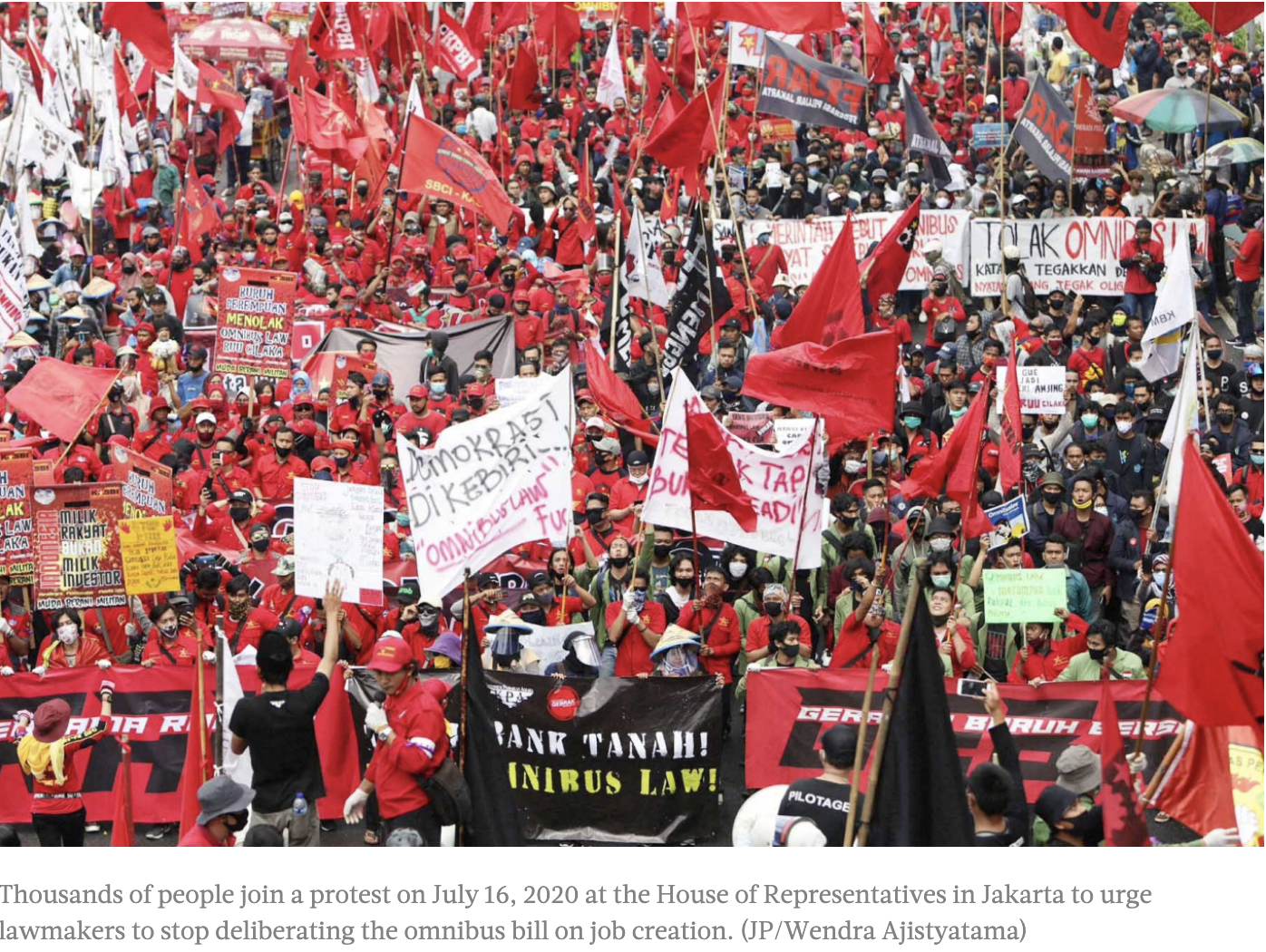350 Asia
Explainer
Omnibus LOL
Indonesia's Omnibus Law reminds us of a drunken ogre. Sloppy, haphazard, aimless.
Since its approval on October 5, 2020 by Indonesia’s House of Representatives, the Job Creation Law continued to reap waves of resistance. Protests took place in dozens of cities in Indonesia, many of them tinged with police brutality. More than 1,000 people were arrested. This law threatens the basic rights of Indigenous Peoples and workers, and exploits workers, fishers and farmers, violates legal procedures, and will cause irreparable damage to the environment.
The Omnibus Law is a giant regulation that summarizes 79 rules and 1200 articles. It will cut regulations so corporations can attract foreign investments and capital. However, 35 global investors managing $41 trillion worth of funds are publicly opposing the law.
Its process has been entirely opaque. The public could not access the legislation up to a week after it was passed. Now there are 5 versions (edit: as of 21 October 2020, 6 versions with 1178 pages document) of Omnibus Law in circulation but more changes are expected to come as the government insists on introducing further “complementary regulations” which include 34 Government Regulations and 5 Presidential Regulations. This is contrary to the original spirit of reducing the all-reaching powers of the legislation.
This bloated rule reminds us of a drunken giant. Haphazardly, these regulations mess up the legal system and procedures. The process was expedited, closed, and prevented public involvement. Regardless of the surroundings, this ogre could not clearly see what it was aiming for.
See what the Omnibus Law has legally violated.
The law can open the gates to more manmade disasters and accelerate the climate crisis. Like a giant who gets drunk in a club, this law could potentially cause environmental damage by deliberately neglecting to protect nature. If this law is implemented, Indonesia will face the threat of losing millions of hectares of forest, eliminating all reforestation efforts that have been done over the years and releasing stored carbon into the atmosphere.
Explore what environmental threats will be triggered by the Omnibus Law.
As with many mythical creatures that like to prey on humans, this ogre takes a toll on laborers and workers. Workers will be threatened with diminishing wage rights, exploited with long working hours and reduced welfare. Coupled with the unbalanced regulations that benefit corporations, the fate of workers will be squashed. We must reject the Omnibus Law.
Learn about the reasons that workers deplore the Omnibus Law.
This Omnibus Giant will hit hard—especially when it comes to farmers, fishers and Indigenous Peoples. This law will allow massive land grabbing and limit the evicted peoples’ access to reparations. This law reduces the already-limited space for public participation in environmental impact assessments. Unfortunately, public participation is seen as a barrier to investment here.
The potential for severe, irreparable environmental damage is very likely if this rule is applied. The Indonesian government must cancel this Omnibus Law, and focus on prioritizing better handling of the COVID-19 pandemic, through an equitable and just recovery.
#JegalSampaiBatal
#BatalkanOmnibusLaw
#MosiTidakPercaya
SIGN THE PETITION
Cancel the Omnibus Law
The Indonesian government approved a sweeping jobs-creation bill that loosens labor and environmental regulations – posing a threat to workers' rights, environmental protection, and the protection of indigenous peoples, farmers, and frontline communities.
The Omnibus Law on Job Creation puts the interests of big investors ahead of workers, communities and the environment. It is alarming that the legislative process was not transparent, taking advantage of the COVID-19 pandemic to halt people’s participation. This law could be detrimental to people, especially to those who are already marginalized as it is not aligned with Indonesia's human rights obligations under the international human rights law.
The Indonesian government must immediately repeal the Omnibus Law and make regulations that prioritize handling the pandemic through the principles of a Just Recovery, especially focusing efforts on the health and welfare of the people, not businesses.
Sign up to show your solidarity with the people of Indonesia in their fight to protect the environment and to demand their rights.
Legally Flawed
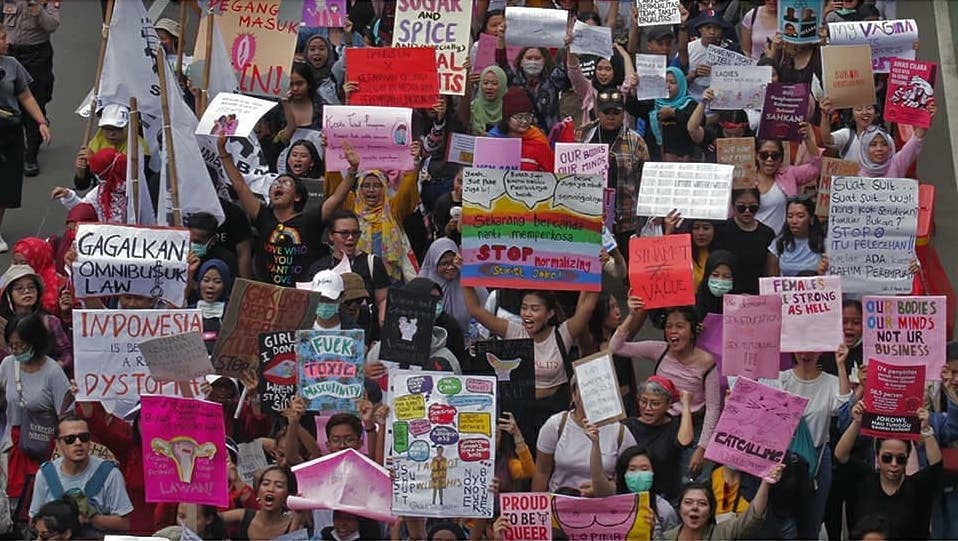
Women March protest. Photo Credit IG @anomanpasha
Not only does the Omnibus Law violate workers’ rights, disempowers Indigenous Peoples, and endangers the environment, the process by which the bill was passed into law was deeply flawed.
First, they rushed the draft without reason for urgency. The deliberation process, which commenced in April 2020, took less than six months — an incredibly short period to discuss such an enormous bill that amends 79 existing laws and consists of 15 chapters and 174 articles. This bill is now a boosted regulation which can negate all other regulations.
The Indonesia’s House of Representative (Dewan Perwakilan Rakyat, or DPR) fast-tracked the work so much that they even worked on a weekend to finish the draft. This is ironic, since there is huge public criticism on how poorly the parliament and legislators are handling the Covid-19 pandemic. Instead of prioritizing a current crisis which led to the deaths of thousands in Indonesia, the legislators passed an unrelated law that further affects the most vulnerable.
Second, the complete lack of transparency and public participation is appalling. The government claimed that the bill will create new jobs and improve workers’ welfare. However, the affected groups – such as labor unions and civil society organizations – were never invited to provide input. This is clearly contrary to the principle of openness and the obligation to encourage public participation in Articles 5 and 96 of Law Number 12 of 2911 on Lawmaking. Moreover, no draft was made accessible to the public until it was submitted to the legislator.
Third, the draft was illegally edited many times after it was passed. On 5th October 2020, the draft was passed with 905 pages. However, a week later on 12th October 2020, the draft ballooned to 1,035 pages. The number of pages then dropped 812 pages right before it was sent to the President. Although DPR claimed the changes were made for the printing format and no substance was disturbed, it is clear that there were significant changes in the last draft.
Endangers the Environment
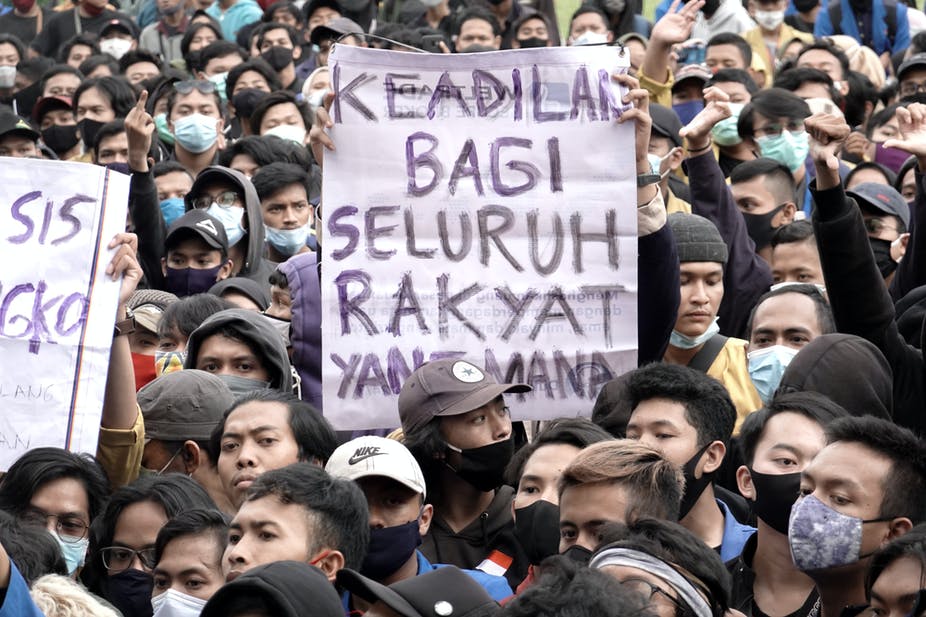
Photo: ANTARA Photo
The controversial Omnibus Law on Job Creation was passed sooner than its initial plan on October 5, 2020 despite mounting opposition over its feared impact on the workers, indigenous peoples rights, and exacerbating environmental disasters in a country where its forests, mangroves and oceans store significant amounts of carbon. The Omnibus Law violates current environmental protection and sustainable development laws which protect these natural resources and the communities who rely upon them.
The environmental permit—a prerequisite to obtaining a business licence— will be abolished in favour of environmental approval. And this approval, unlike before, does not have a criteria. The EIA authority and environmental feasibility decisions will fall under the authority of the Central Government, stripping the communities’ rights to access a good and healthy environment, and to participate and to fight for justice.
The previous law on the minimum limit of 30% of forest areas based on watersheds and/or islands removed and converted into areas that must be maintained in accordance with the physical and geographical conditions of watersheds and/or islands. Referring to Madani’s analysis, 5 provinces in Indonesia could lose their natural forests completely based on the current deforestation rates, and the Omnibus Law will accelerate this loss: Riau Province in 2032; Jambi and South Sumatra Provinces in 2038, Bangka Belitung Province in 2054, and Central Java Province in 2056.
Permit holders will only be responsible for fire prevention and control, and no longer held responsible in their work areas or concessions. This means that corporations damaging the environment cannot be criminally prosecuted. They can only be fined. The blame for crimes committed by the corporation will fall on lower-level staff and middle-management.
The Central Government will abolish the authorities of local and regional governments, meaning that the basic legal provisions are replaced with weaker regulations without repercussions to environmental wrongdoers. This Law will potentially further drive Indonesia’s deforestation and harm any reforestation and climate efforts made to date. This law will also open up space for exploitation of our nature to the widest possible extent, without control or restrictions.
Harm for Workers
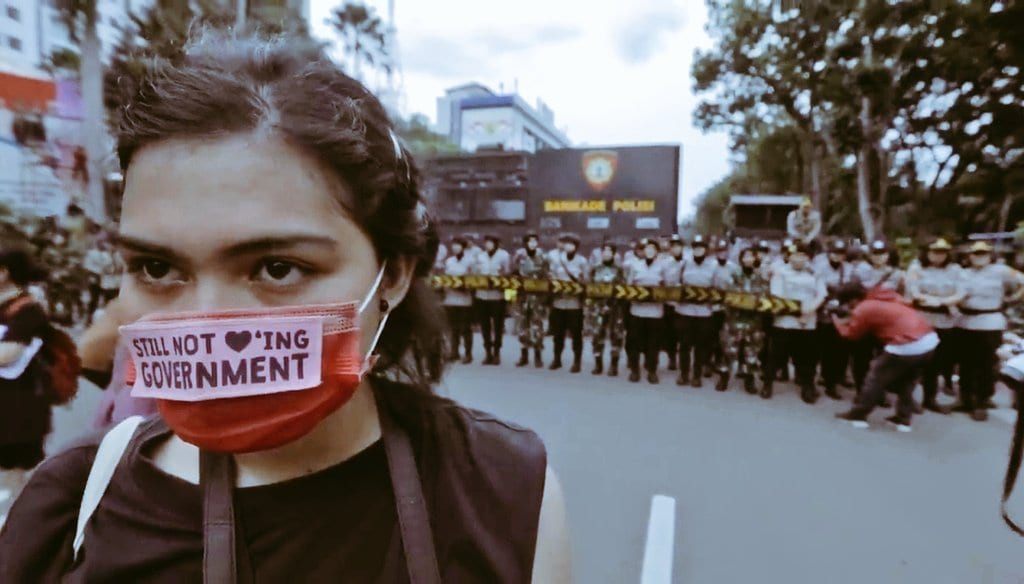
Photo: WatchDoc Documentary – Mosi Tidak Percaya
The Omnibus Law amended existing laws to attract business and investments at the expense of workers —such as an easy-hiring and easy-firing system. The problems from the Omnibus Law include unfair wages, loose employment contracts, unreasonable limitations on overtime working hours, and potential unpaid leave, among others.
The provision on the minimum wage and working hours is unclear, allowing employers to massively exploit their employees. Workers can be forced to work extra hours with no extra pay or be severely underpaid for overtime. On top of that, the law will revoke the city or district-level set minimum wage regardless of differences in cost of living across cities and districts, expanding the income disparity.
There is more to the problem of wages in the Omnibus Law: Current overtime limit will be increased unreasonably certain forms of paid leave will be eliminated, including menstruation leave, personal leave (such as marriage, circumcision, baptism, or death in the family), parental leave, and religious holidays, currently taken in addition to the statutory 12-days annual leave.
Loose employment contracts will allow employers to keep workers on temporary contracts for an indefinite period of time. It may exempt employers from their obligation to place workers on permanent contracts, thus heightening insecurities at work and limiting the protection of workers. Workers may also face a higher risk of termination, as the Omnibus Law specifically states that an employment agreement, company regulations or collective labor agreement can set out other reasons for termination and not limited to the reasons set out under the law.
Deprivation of Indigenous Peoples’ Rights
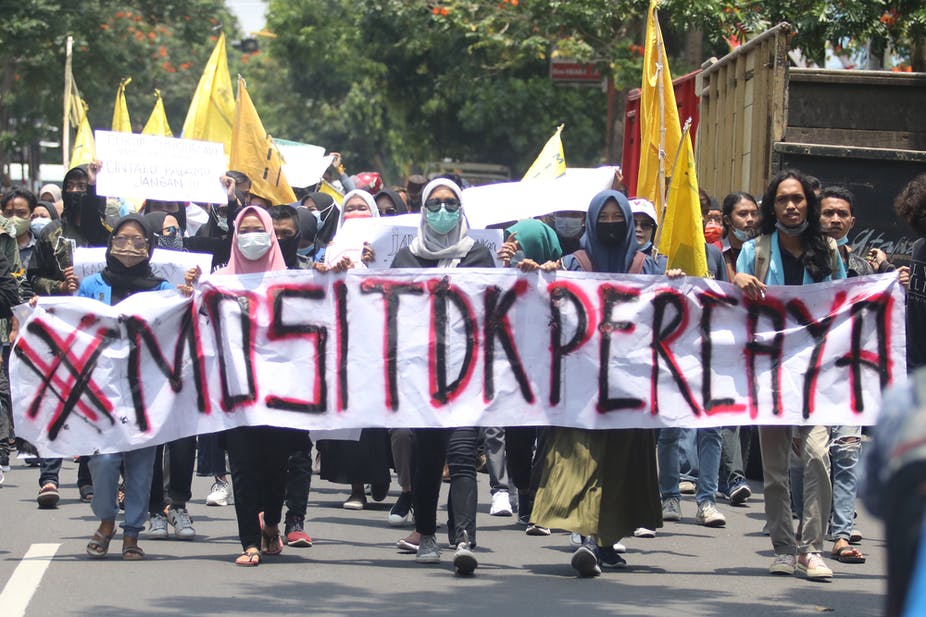
Photo: ANTARA Photo
The Job Creation Bill will result in massive land grabbing for Indigenous Peoples and Local Communities, without access to reparations or remedies.
The law reduces the already-limited public participation space in the environmental impact assessment mechanism. Unfortunately, the logic here is that peoples’ participation is seen as an obstacle for investments.
The Indonesian government further downgraded the obligation of environmental license from a permit to approval through the bill. A permit is contestable through administrative court, while approval is not a subject of administrative court cases, and does not list out a clear criteria. This change significantly impacts Indigenous Peoples, farmers, and fisherfolk because their livelihood depends on the environment. The loss of multiple permits will cause IPs and local communities to lose legal action to defend themselves and their land.
The government of Indonesia created a new institution called the “Land Bank”, which aims to prepare and provide land for investment purposes. Coupled with the easing of land clearing requirements, communities will lose the legal right to defend their land.
For Indigenous Peoples and local communities in rural areas, opening the floodgates to massive land grabbing will also erode their cultural identity. Indigenous and local communities in rural areas are in danger of being displaced, and their access to their land is restricted.
For fisherfolk and coastal communities, sanctions and regulations are tightened. Inversely proportional to relief received by big fishery business, small and traditional fishers will be measured by the same yardstick and subjected to sanctions if they do not meet the criteria.
#JegalSampaiBatal
#BatalkanOmnibusLaw
#MosiTidakPercaya
